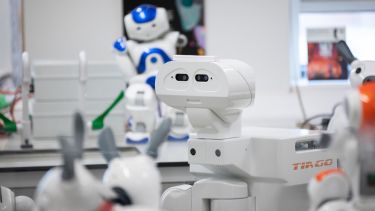The Imperfectly Relatable Robot: a critical robotics approach to failures in human-robot relations

Event details
Description
This event has been postponed. Please check back for a rescheduled date.
The Imperfectly Relatable Robot: a critical robotics approach to failures in human-robot relations - Katherine Harrison, Department of Thematic Studies – Gender Studies, Linköping University, Sweden
“Critical robotics” denotes a field that aims to address the tendency in Human-Robot Interaction (HRI) towards relying on technical knowledge to resolve the challenges of achieving social interactions with robots. In particular, it aims to provide more “human-centered and holistic approaches to question established assumptions of design in HRI research” (Serholt et al 2022). It is an inherently interdisciplinary activity, which often involves collaboration between social scientists and engineers or computers scientists working “within” HRI.
In this presentation, I will talk about a critical robotics research project titled “The ethics and consequences of AI and caring robots” currently underway in Sweden. In particular, I want to share a sample from my own work within the project which focuses on failure. Usually, research to improve human-robot interactions in social robotics focuses on producing a “positive” affective experience by exploring how to increase human participants’ feelings of trust or safety. However, there is an emerging interest amongst roboticists in the role played by robotic failures in building more complex and nuanced relationships between humans and social robots.
Robots fail often, in many and varied ways, some quite mundane, some more significant. But this might not be a bad thing. What if encountering a robot who fails, who is a little less “perfect”, might actually make it more relatable and human-like? Bringing critical theory into conversation with social robotics research, my project explores how failure might be used to improve human-robot relations.
Bio: Katherine Harrison is Associate Professor in Gender Studies at Linköping University. Her research sits at the intersection of Science & Technology Studies, media studies, and feminist theory, bringing critical perspectives on knowledge production to studies of different digital technologies. She has received funding from the Swedish Civil Contingencies Agency, the Danish Council for Independent Research, Marcus and Amalia Wallenberg Foundation, Riksbankens Jubileumsfond, Marianne and Marcus Wallenberg Foundation and the Swedish Research Council for Sustainable Development (FORMAS). She is currently co-PI for two WASP-HS (Wallenberg AI, Autonomous Systems and Software Program – Humanity and Society) projects titled: "The ethics and social consequences of AI and caring robots: Learning trust, empathy and accountability", and "Operationalising ethics for AI: translation, implementation and accountability challenges".
To join us sign up at: https://www.eventbrite.com/e/the-imperfectly-relatable-robot-katherine-harrison-linkoping-univ-tickets-862478154377
If no more tickets are available, email s.desaille@sheffield.ac.uk for the link.
The Institute for the Study of the Human (iHuman) at the University of Sheffield brings together the fields of Science and Technology Studies and Critical Disability Studies for disruptive research into what it means to be human. For more information, visit us at: https://www.sheffield.ac.uk/ihuman

iHuman
How we understand being ‘human’ differs between disciplines and has changed radically over time. We are living in an age marked by rapid growth in knowledge about the human body and brain, and new technologies with the potential to change them.
